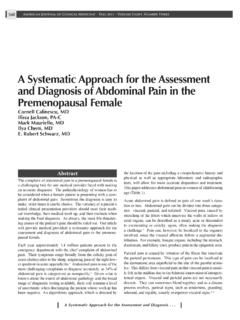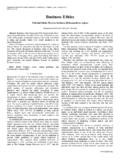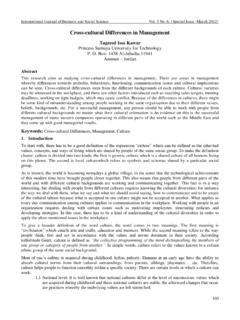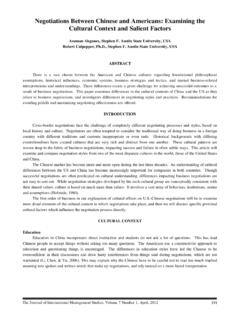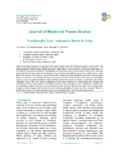Transcription of The role of culture in teaching and learning of …
1 Express, an International journal of Multi Disciplinary Research ISSN: 2348 2052, Vol. 1, Issue 4, April 2014. Available at: THE ROLE OF culture IN teaching AND learning OF ENGLISH. AS A FOREIGN LANGUAGE. by Rahim Uddin Choudhury Lecturer, Department of English Jazan University, Kingdom of Saudi Arabia Abstract Language is a means of expression. We express our feelings, emotions, thoughts, needs, desires etc. in words, symbols and gesture which is considered as language. Language can be defined as verbal, physical, biologically innate, and a basic form of communication. culture is the characteristics of a particular group of people, defined by everything from language, religion, cuisine, social habits, music and arts.
2 Thus culture finds its expression in language; so, learning a new language without familiarity with its culture remains incomplete. An important question arises here, is it necessary to learn about the culture of the target language to acquire English as a foreign or second language? There are great discussions by many scholars and researchers on this topic for decades. This article aims at defining culture , its relationship with language and what role it plays in teaching and learning English as a foreign or second language. This also shed light on how to teach culture in English language classroom. Key words: language, culture , English as a foreign language (EFL). 1.
3 Introduction Currently, English is the most widely spoken language in the world. Due to its spread, starting with the colonization period and continuing with the economic and political power of the , it has been used for different purposes around the world such as education, commerce, tourism, and science. People all around the world continue to learn English to reach their different aims. A critical question arises in terms of English language teaching at this point, that is, whether to 1. Express, an International journal of Multi Disciplinary Research ISSN: 2348 2052, Vol. 1, Issue 4, April 2014. Available at: teach culture ' along with English or not. The question of teaching culture ' along with English has been discussed by some scholars from the fields of applied linguistics and sociolinguistics for nearly two decades.
4 There are four views regarding the issue. The first one states that target language culture '. should be taught along with English to acculturate language learners into the cultures of English speaking countries (Byram, 1990; Byram & Flemming, 1998). The second view states that there should not be any teaching of the target language culture ' together with English in the countries where English is an institutionalized variety (Kachru, 1985, 1986; Kachru & Nelson, 1996;. Canagarajah, 1999). Other two views also reject the idea of teaching target language culture '. along with English. However, while one of the views supports the teaching of local culture ' in English language teaching (Kramsch & Sullivan, 1996; McKay, 2003), the other view holds the position that English has become a lingua franca and it should be taught in a culture -free context (Alptekin, 2005; Jenkins, 1996, 2000, 2002, 2005; Seidlhofer, 2001).
5 2. culture The word culture has many different meanings. For some it refers to an appreciation of good literature, music, art, and food. For a biologist, it is likely to be a colony of bacteria or other microorganisms growing in a nutrient medium in a laboratory Petri dish. However, for anthropologists and other behavioral scientists, culture is the full range of learned human behavior patterns. The term was first used in this way by the pioneer English Anthropologist Edward B. Tylor in his book, Primitive culture , published in 1871. Tylor said that culture is "that complex whole which includes knowledge, belief, art, law, morals, custom, and any other capabilities and habits acquired by man as a member of society.
6 " Of course, it is not limited to men. Women possess and create it as well. Since Tylor's time, the concept of culture has become the central focus of anthropology. culture is a powerful human tool for survival, but it is a fragile phenomenon. It is constantly changing and easily lost because it exists only in our minds. Our written languages, governments, buildings, and other man-made things are merely the products of culture . They are not culture in themselves. For this reason, archaeologists can not dig up culture directly in their excavations. The broken pots and other artifacts of ancient 2. Express, an International journal of Multi Disciplinary Research ISSN: 2348 2052, Vol.
7 1, Issue 4, April 2014. Available at: people that they uncover are only material remains that reflect cultural patterns--they are things that were made and used through cultural knowledge and skills. In other words, culture is the characteristics of a particular group of people, defined by everything from language, religion, cuisine, social habits, music and arts. Cultures are what make countries unique. Each country has different cultural activities and cultural rituals. culture is more than just material goods, that is things the culture uses and produces. culture is also the beliefs and values of the people in that culture . culture also includes the way people think about and understand the world and their own lives.
8 culture can also vary within a region, society or sub group. A workplace may have a specific culture that sets it apart from similar workplaces. A region of a country may have a different culture than the rest of the country. For example, Canada's east coast Maritime region has a different culture than the rest of Canada, which is expressed by different ways of talking, different types of music, and different types of dances. A family may have a specific set of values, because of this people every time follow their religion to have or find new culture . 3. Importance of culture in language teaching According to Wei (2005:56), language has a dual character: both as a means of communication and a carrier of culture .
9 Language without culture is unthinkable, so is human culture without language. A particular language is a mirror of a particular culture . Brown (1994:165) describes the relation between language and culture as follows: 'A language is a part of a culture and a culture is a part of a language; the two are intricately interwoven so that one cannot separate the two without losing the significance of either language or culture '. In a word, culture and language are inseparable (cited in Jiang, 2000: 328). When it comes to the realm of teaching and learning , as Gao (2006) presents it, the interdependence of language learning and cultural learning is so evident that one can conclude that language learning is culture learning and consequently, language teaching is cultural teaching ( ).
10 Gao further states that foreign language teachers should be aware of the place of cultural studies in foreign language classroom and attempt to enhance students' cultural awareness and improve their communication competence. Wang (2008), likewise, asserts that 'foreign language teaching is foreign culture teaching , and foreign language teachers are foreign culture teachers'. According to Tomalin (2008), the international role of the English language and globalisation are the two main reasons 3. Express, an International journal of Multi Disciplinary Research ISSN: 2348 2052, Vol. 1, Issue 4, April 2014. Available at: to teach culture as a fifth language skill, in addition to listening, speaking, reading and writing.

